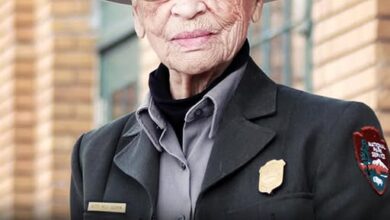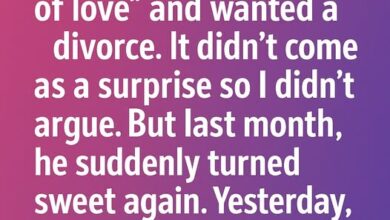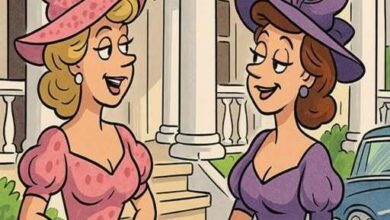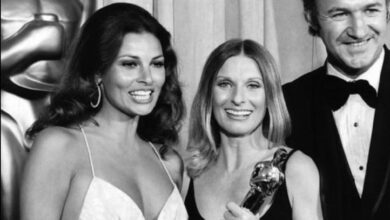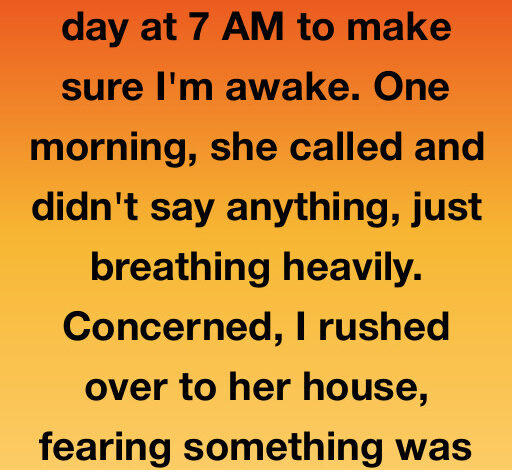
The Call That Changed Everything
My mom calls me every morning at 7 sharp to make sure I’m up. It’s our ritual—her voice, my groggy “I’m awake,” a quick reminder to eat breakfast. That morning, she called and said nothing. Just breath. Ragged, shallow breath.
“Mom?” I said. “Mom, can you hear me?”
Silence. The breathing didn’t stop.
I grabbed my keys and drove like every light was green. Her front door was unlocked. My heart went cold. I kept her on the line, following the sound of air moving in and out like a thin thread leading me upstairs. She was perched on the edge of her bed, one hand white-knuckled over her chest, eyes wide with a kind of fear I’d never seen on her face.
“I couldn’t move,” she whispered. “I don’t know what happened.”
I eased her onto the pillows and dialed 911. The paramedics came fast—blessedly fast. “Minor heart attack,” one of them said, already working, already moving. “You called at the right time.” They wheeled her out. I followed in a fog, gripping the steering wheel like it could keep me from falling apart.
It’s funny what breaks your picture of a person. My mom has always been steel and motion. Two jobs. Packed lunches. A laugh that made bad days less sharp. I never imagined seeing her small like that, swallowed by hospital sheets.
She stayed three days. I brought soup and her favorite blanket and magazines she never actually read. And yet something in her had shifted. Not just the fatigue. A quietness. A distance, like she was standing in a different room of herself.
“You okay, Ma?” I asked one night, watching the monitor blink out her heartbeat.
She kept her gaze on the window. “I’ve been keeping a secret,” she said. “I’ll tell you when I’m home.”
I let it sit. Maybe meds. Maybe the scare. She was discharged. The calls stopped. No more 7 A.M. check-ins. I started calling her instead, and her voice would float somewhere far away, like we were speaking through water.
Two weeks later I showed up with groceries and found her at the kitchen table, photo albums spread open like wings. “I need to tell you now,” she said.
I put the bags down and sat.
“You have a sister.”
The floor seemed to tilt. My whole life I’d been the only child. I could have sworn it was a fact written into the house itself.
“Her name is Nora,” she said. “She’s two years older. I gave her up. I was nineteen. My parents… they insisted. I never even held her.”
She slid a photo across the table. A baby in a yellow blanket, wristband peeking out. The edges were soft from being handled too much. My hands trembled as I took it.
“Why now?” I asked.
“Because that morning, when my heart went wrong, I thought it was the end.” Her eyes shone. “I couldn’t die with this in me. You deserve to know.”
All the feelings crowded the doorway—shock, hurt, tenderness—and none of them knew who should walk in first. I wasn’t angry. Not really. Just stunned at the space that had existed beside us for decades, invisible and huge.
“Do you know where she is?” I asked.
“Indiana,” she said. “That’s all I was ever told.”
That night, I lay awake with the yellow blanket burned into my brain. I told my friend Malik over dinner. “You have to try to find her,” he said. “If it were me, I couldn’t let it go.”
So I started. Forums. Ancestry sites. Late-night deep dives into records that looked like another language. Eventually I hired a search agency and kept it from my mom; I didn’t want to hand her hope and then take it back.
Three months of nothing. Then an email:
Possible Match Found — Nora Bryant.
Ohio. Thirty-two. Married. No kids. And the line that twisted my stomach: No knowledge of adoption.
I sat with that for a week. What right did I have to knock on a life and call myself family?
I told my mom. She cried. “She doesn’t know?” I shook my head. We talked until our throats hurt, grief and gratitude braided together.
“I just want to see her once,” my mom said. “Even if she never wants to see me again.”
I wrote a letter, hands shaking.
Hi Nora,
My name is Adrian. I know this may be a shock, but I believe we may be siblings…
I mailed it. I waited. Two weeks. Nothing. Then a voicemail: “Hi, this is Nora. I got your letter. I… I’m not sure what to say, but… can we talk?”
Our first call was gentle and strange. She was careful; I was careful. We traded little pieces of ourselves. She agreed to a DNA test, to be sure. Two weeks later: full sibling match.
We cried on the phone like the ocean had finally reached our throats.
She flew in the next month. When I saw her in the arrivals crowd, the answer was immediate—our mother’s face, softened and new. We hugged, long and quiet. I drove her home. When my mom opened the door and saw her, her knees went loose and she clutched the frame like it was the only solid thing left. “Oh my God,” she breathed.
Nora stepped into her arms. No introduction could have done more than that embrace.
Those days were all learning and unlearning. Old pictures. Family recipes. Baby videos that made us both laugh and ache. Nora brought her husband the following weekend; he fit in like he’d been sitting at that table for years.
Then she called me with the twist.
“I talked to my parents,” she said. “They knew.”
“Knew what?”
“That I was adopted. That the first couple backed out and they got the call the next day. They had Mom’s name in the original documents. They agreed to a closed adoption and… they kept it from me.”
“Why?”
“They were afraid. That I’d go looking. That loving them would look like betrayal if I found someone else to love.” She paused. “They regret it. And they want to meet her. To thank her.”
The next weekend, they drove over. In the doorway, three people who had circled the same pain for decades finally stepped into it together. There was no blame. There were tears and thank-yous, and my mom telling them they’d given Nora what she never could: a steady house and a childhood built on love. We dragged the table into the backyard and made one long, uneven banquet. Two families passing dishes like this had always been the plan.
That night, while we were stacking plates, my mom touched my arm. “I thought my worst mistake would be the only story left of me,” she said. “But life… it loops back. It gives you a chance to close the circle.”
Now the mornings have changed again. My phone rings at 7 A.M.—sometimes it’s my mom, sometimes Nora, sometimes both on speaker—three voices letting each other know the day has started and we’re still here for it.
I think about the way it happened: a call with nothing but breath; an unlocked door; the soft thud of my feet on the stairs; a secret finally spoken into a kitchen full of photographs. That heart attack cracked the seal on a buried room and turned it into a doorway.
If there’s a lesson I’ll keep, it’s this: the scariest moments can be the hinge that opens the rest of your life. Secrets want daylight. Forgiveness makes room for what’s next. And family—whether found, returned, or made—has a way of showing up exactly when you decide to let it.
